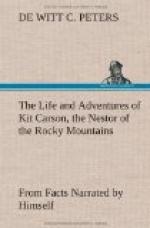“Their object accomplished, our men gathered up all the surviving horses, fifteen in number, returned upon their trail, and rejoined us at our camp in the afternoon of the same day. They had rode about one hundred miles in the pursuit and return, and all in thirty hours. The time, place, object, and numbers considered, this expedition of Carson and Godey may be considered among the boldest and most disinterested which the annals of western adventure, so full of daring deeds, can present. Two men, in a savage desert, pursue day and night an unknown body of Indians into the defiles of an unknown mountain—attack them on sight, without counting numbers—and defeat them in an instant—and for what? To punish the robbers of the desert, and to avenge the wrongs of Mexicans whom they did not know. I repeat: it was Carson and Godey who did this—the former an American, born in Kentucky; the latter a Frenchman by descent, born in St. Louis; and both trained to western enterprise from early life.”
The stolen property was restored to the Mexicans without one cent being demanded or received by either Carson or Godey.
It was not for the love of Indian fighting as many may suppose, that Kit Carson was moved to take part in such expeditions; but, when the life of a fellow-creature is exposed to Indian barbarities, no living man is more willing, or more capable of rendering a lasting service than Christopher Carson. A name that, wherever it is known, is ranked among the “bravest of the brave.”




